In today's hyper-competitive manufacturing landscape, operational efficiency and uninterrupted production are paramount. Even a momentary lapse in IT systems can trigger a cascade of disruptions, leading to significant financial losses, missed deadlines, and damaged reputations. For startup owners and CXOs in the manufacturing sector, understanding and mitigating the risks of IT downtime is not just a technical concern; it's a strategic imperative for survival and growth. This is where the transformative power of DevOps comes into play.
This comprehensive blog will delve into how implementing DevOps practices in manufacturing can drastically reduce IT downtime in manufacturing, enhance operational agility, and drive innovation. We will explore the core principles of DevOps, its specific applications within the manufacturing industry, and the tangible benefits of DevOps for factory IT systems.
Furthermore, we will examine how DevOps consulting services can provide the expertise and guidance to integrate these practices seamlessly. Whether you are in the automotive sector or any other branch of manufacturing, understanding how DevOps reduces downtime in manufacturing is crucial for building a resilient and future-proof operation.
The Crippling Impact of IT Downtime on Manufacturing
Imagine a critical production line grinding to a halt due to a server failure. The immediate consequences are evident: stalled production, idle workforce, and a backlog of orders. However, the ripple effects extend far beyond the factory floor. IT downtime in manufacturing can lead to:
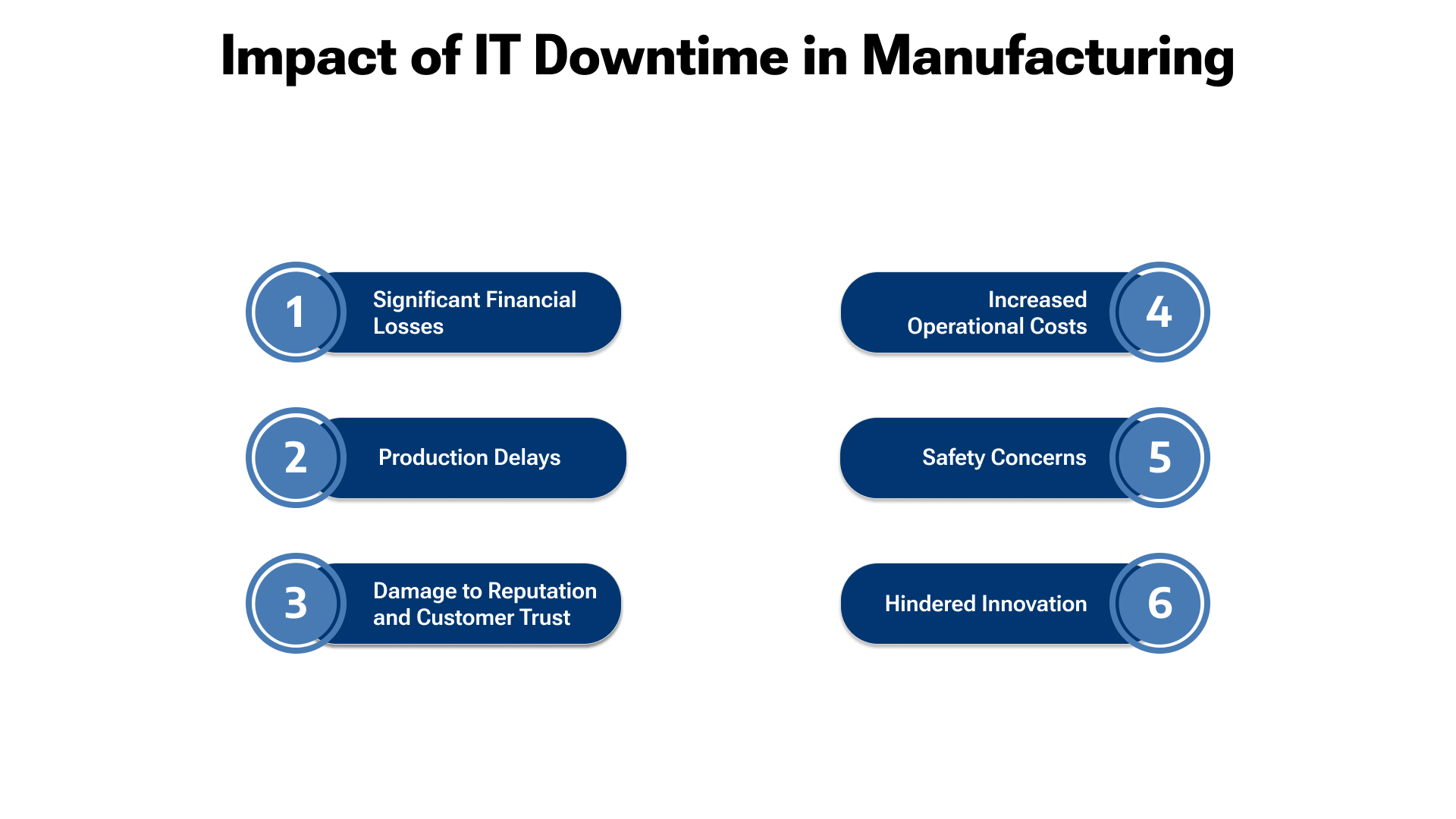
Significant Financial Losses: Lost production translates directly to lost revenue. Moreover, companies may face penalties for late deliveries and incur additional emergency repairs and overtime costs.
Production Delays: Unplanned outages disrupt the entire supply chain, causing delays in fulfilling orders and potentially damaging customer relationships. Preventing production delays with DevOps is a key advantage.
Damage to Reputation and Customer Trust: Consistent delays and unreliable delivery schedules erode customer confidence and can lead to the loss of valuable contracts.
Increased Operational Costs: Reactive IT support, emergency fixes, and the need for redundant systems to mitigate downtime all contribute to higher operational expenses.
Safety Concerns: In highly automated environments, IT failures can pose safety risks to personnel and equipment.
Hindered Innovation: When IT teams are constantly firefighting downtime issues, they have less time and resources to focus on strategic initiatives and technological advancements like manufacturing process automation.
For startup owners with limited resources, the impact of IT downtime can be particularly devastating, potentially jeopardizing the entire business. Therefore, adopting proactive strategies to minimize IT downtime with DevOps is not just advisable; it's essential for sustainability.
DevOps: A Cultural and Technological Shift
DevOps is not merely a set of tools or technologies; it represents a fundamental cultural shift and collaboration between development (Dev) and operations (Ops) teams. Traditionally siloed, these teams often operated with conflicting priorities and processes, leading to inefficiencies, delays, and ultimately, increased downtime.
DevOps breaks down these silos by fostering a culture of shared responsibility, communication, and collaboration throughout the entire software development and delivery lifecycle.
This integration, combined with the adoption of specific practices and tools, enables organizations to:
- Automate Repetitive Tasks: Automating infrastructure provisioning, configuration management, testing, and deployment reduces manual errors and accelerates delivery cycles. Infrastructure automation for factories is a critical aspect of this.
- Implement Continuous Integration and Continuous Delivery (CI/CD): CI/CD pipelines enable frequent and reliable software releases, minimizing the risk associated with large, infrequent deployments. Continuous delivery in manufacturing ensures that updates and fixes are rolled out efficiently.
- Embrace Continuous Monitoring and Feedback: Real-time monitoring of systems and applications provides immediate insights into performance and potential issues, allowing for proactive intervention.
- Foster a Culture of Collaboration and Communication: Open communication and shared goals between development and operations teams lead to faster problem resolution and improved overall efficiency.
- Adopt a Data-Driven Approach: Utilizing metrics and analytics to identify bottlenecks, track performance, and make informed decisions for continuous improvement.
How DevOps Directly Reduces IT Downtime in Manufacturing
The principles and practices of DevOps directly address the root causes of IT downtime in manufacturing environments:
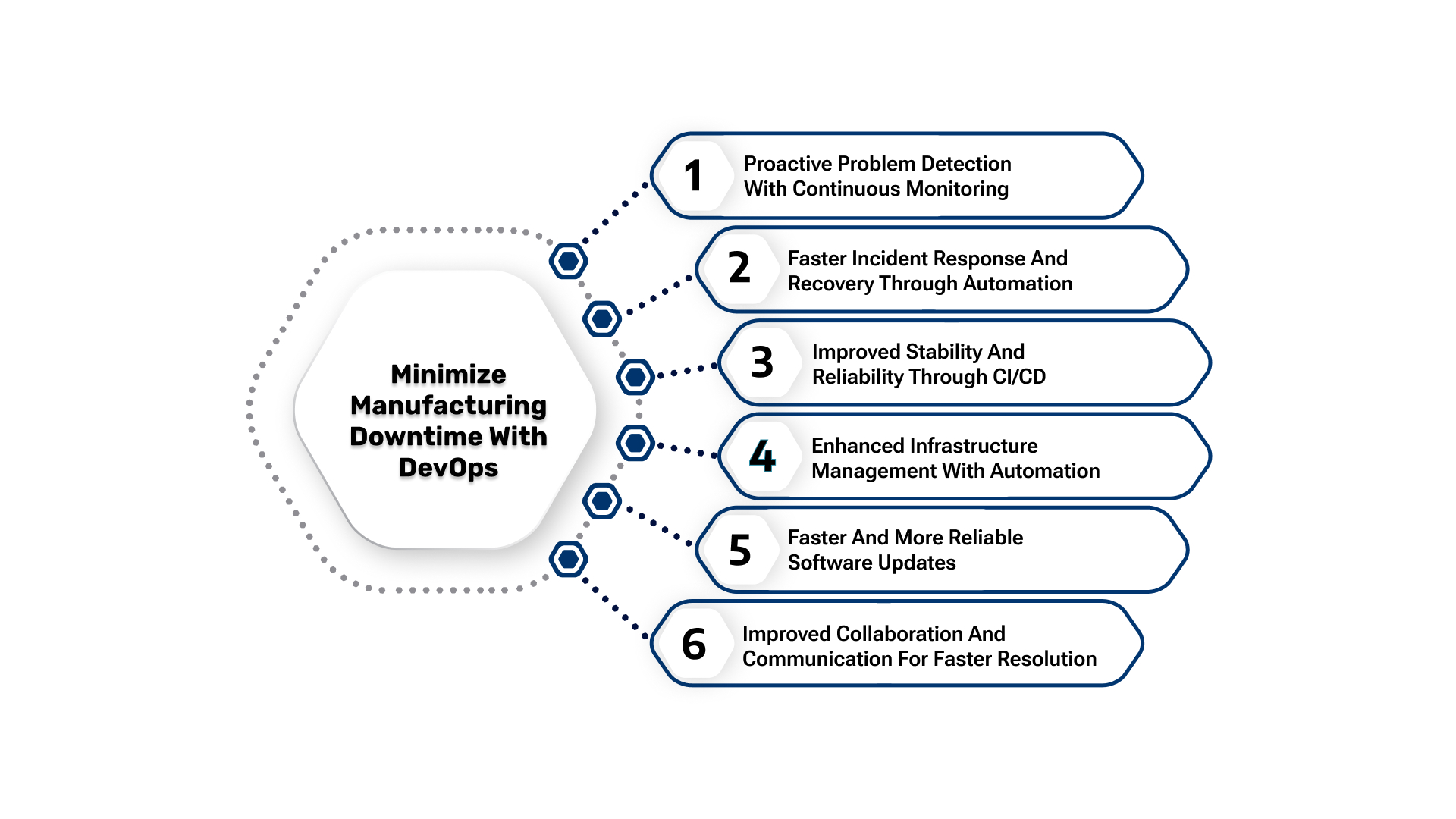
1.Proactive Problem Detection with Continuous Monitoring:
DevOps emphasizes the importance of real-time monitoring to reduce IT failures in all aspects of the IT infrastructure and applications. By implementing robust monitoring tools and setting up alerts for anomalies, potential issues can be identified and addressed before they escalate into full-blown outages. This proactive approach is crucial for preventing production delays with DevOps.
2. Faster Incident Response and Recovery through Automation:
DevOps's automation capabilities enable faster diagnosis and recovery when an incident occurs. Infrastructure as Code (IaC) allows for rapid provisioning of new environments, while automated deployment scripts can quickly roll back faulty updates or deploy fixes. This significantly reduces the duration of IT downtime solutions.
3. Improved Stability and Reliability through CI/CD:
The CI/CD pipeline incorporates automated testing at every stage of the development process. This ensures that code changes are thoroughly validated before being deployed to production, minimizing the risk of introducing bugs or errors that could lead to downtime. Continuous delivery in manufacturing fosters a culture of quality and stability.
4. Enhanced Infrastructure Management with Automation:
Managing complex IT infrastructure in a manufacturing setting can be challenging. DevOps practices like Infrastructure as Code (IaC) and configuration management tools automate infrastructure component provisioning, configuration, and management. This reduces manual errors, ensures consistency, and simplifies disaster recovery, contributing to better IT infrastructure management.
5. Faster and More Reliable Software Updates:
Outdated software can be a significant source of vulnerabilities and instability. DevOps facilitates frequent and reliable software updates through automated deployment pipelines, ensuring that systems are always running on the latest, most secure versions. Thus, the risk of downtime caused by software flaws is reduced.
6. Improved Collaboration and Communication for Faster Resolution:
When issues arise, the collaborative culture of DevOps ensures that development and operations teams work together seamlessly to diagnose and resolve problems quickly and efficiently. Shared dashboards, communication channels, and a focus on collective ownership contribute to faster resolution times and minimized downtime.
For many manufacturing companies, especially startups with limited in-house expertise, engaging DevOps consulting services can significantly accelerate and de-risk the adoption of DevOps practices. These consultants bring specialized knowledge and experience in:
- Assessing the current IT landscape and identifying areas for improvement.
- Developing a tailored DevOps strategy aligned with business goals.
- Implementing the necessary tools and technologies.
- Training and mentoring internal teams.
- Establishing CI/CD pipelines and automation frameworks.
- Setting up robust monitoring and alerting systems.
- Guiding the cultural transformation required for successful DevOps adoption.
By partnering with experienced consultants, manufacturing companies can avoid common pitfalls, accelerate time-to-value, and ensure a smooth and effective transition to a DevOps model. This will ultimately lead to significant reductions in IT downtime in manufacturing.
How Real-Time Monitoring Prevents Production Failures
Real-time monitoring to reduce IT failures is at the heart of a proactive DevOps strategy for minimizing downtime. This involves continuously collecting, analyzing, and visualizing key performance indicators (KPIs) across the IT infrastructure and application stack.
By having a constant pulse on system health, manufacturing companies can:
- Detect Anomalies Early: Real-time monitoring tools can identify deviations from normal behavior, such as sudden spikes in CPU usage, memory leaks, or network latency, often indicating an impending issue.
- Receive Immediate Alerts: When predefined thresholds are breached, automated alerts notify the relevant teams, allowing them to investigate and address the problem before it impacts production.
- Gain Deep Visibility: Comprehensive monitoring provides a holistic view of system performance, enabling teams to pinpoint the root cause of issues quickly.
- Proactive Capacity Planning: By tracking resource utilization trends, companies can anticipate future capacity needs and avoid performance bottlenecks that could lead to downtime.
- Improve System Performance Optimization: Continuous monitoring provides valuable data for identifying areas where system performance can be improved, leading to a more stable and efficient environment.
The insights gained from real-time monitoring to reduce IT failures are invaluable for preventing production delays with DevOps and ensuring the smooth operation of factory automation tech.
Predictive Maintenance Using AI & IoT with DevOps
Taking a step further, integrating predictive maintenance strategies with AI, the Internet of Things (IoT), and DevOps offers a powerful approach to minimizing IT downtime in manufacturing. This synergy allows companies to move beyond reactive and proactive maintenance to anticipate and prevent failures.
Here’s how:
- IoT Sensors for Data Collection: IoT devices deployed across the manufacturing floor and within IT infrastructure can collect real-time data on equipment performance, environmental conditions, and system metrics.
- AI and Machine Learning for Analysis: AI and ML algorithms can analyze this data to identify patterns, anomalies, and leading indicators of potential failures that traditional monitoring methods might miss.
- DevOps for Integration and Automation: DevOps practices facilitate the seamless integration of IoT data streams and AI/ML models into the IT infrastructure and operational workflows. Automation pipelines can trigger proactive maintenance tasks or automatically adjust system configurations based on AI-driven predictions.
- Predicting and Preventing Failures: By identifying potential issues before they occur, predictive maintenance minimizes unexpected downtime, optimizes maintenance schedules, reduces costs associated with emergency repairs, and improves the overall reliability of factory automation tech.
This convergence of AI, IoT, and DevOps represents a significant advancement in IT downtime solutions and system performance optimization within the manufacturing industry.
Implementing DevOps in Manufacturing: Key Practices and Tools
Implementing DevOps in a manufacturing industry environment requires a strategic approach and adopting specific practices and tools. DevOps consulting services can provide invaluable expertise in navigating this transition. Some key practices include:
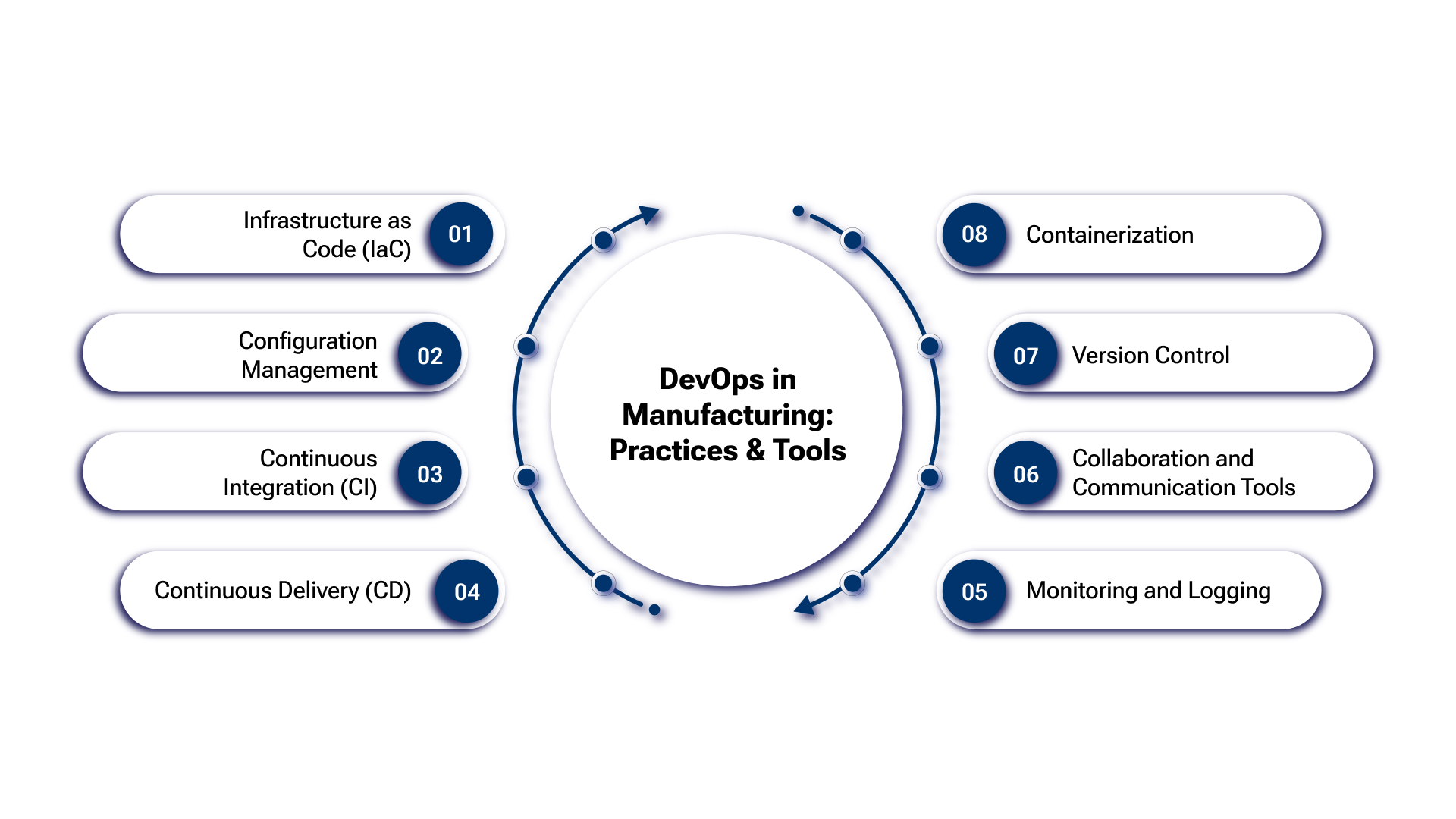
- Infrastructure as Code (IaC): This involves managing infrastructure using code, enabling automation, version control, and repeatability. Tools like Terraform and AWS CloudFormation are commonly used.
- Configuration Management: Automating the configuration and maintenance of servers and applications. Tools like Ansible, Chef, and Puppet streamline this process.
- Continuous Integration (CI): Frequently merge code changes into a central repository and automatically build and test the software. Tools like Jenkins, GitLab CI, and CircleCI are popular choices.
- Continuous Delivery (CD): Automating the release of software changes to production environments safely and reliably. The same tools used for CI often support CD.
- Monitoring and Logging: Implementing comprehensive monitoring tools to track system performance, identify anomalies, and provide insights for troubleshooting. Tools like Prometheus, Grafana, ELK Stack (Elasticsearch, Logstash, Kibana), and Datadog are widely used.
- Collaboration and Communication Tools: Utilizing platforms that facilitate seamless communication and collaboration between teams, such as Slack, Microsoft Teams, and Jira.
- Version Control: Using systems like Git to track changes to code and configurations, enabling easy rollback and collaboration.
- Containerization: Using technologies like Docker and Kubernetes to package and deploy applications in isolated environments, improving portability and scalability.
Choosing the best DevOps tools for manufacturing companies will depend on the organization's specific needs and existing infrastructure.
Benefits Beyond Downtime Reduction: The Broader Impact of DevOps
While reducing IT downtime in manufacturing is a primary benefit, adopting DevOps offers a broader range of advantages for factory IT systems and the overall business:
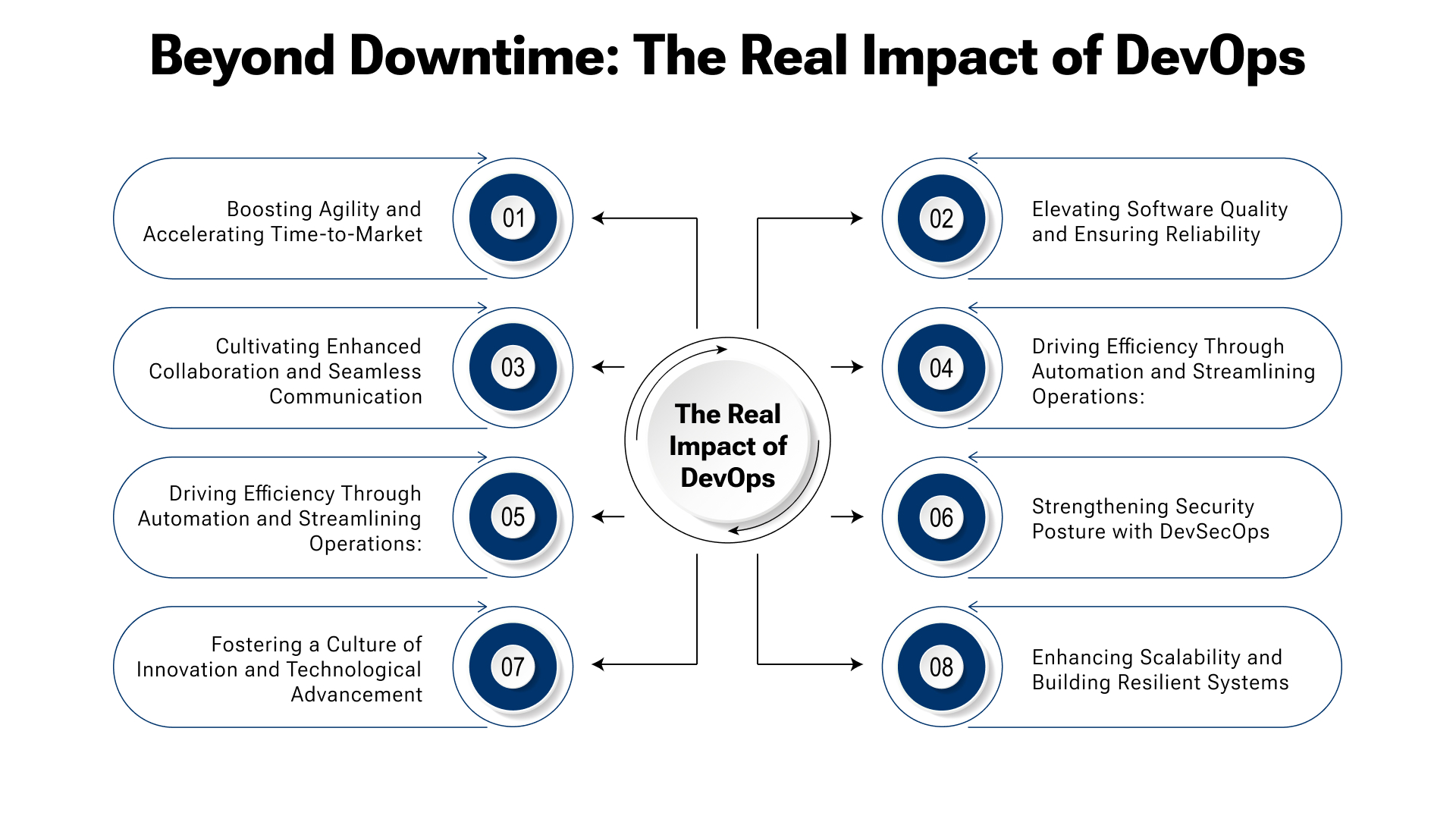
While the immediate and compelling advantage of adopting DevOps in the manufacturing industry significantly reduces IT downtime, the transformative impact extends beyond operational stability. Embracing this cultural and technological shift unlocks a cascade of benefits that can revolutionize factory IT systems and propel the overall business towards greater efficiency, innovation, and market responsiveness.
Understanding these broader advantages is crucial for startup owners and CXOs to recognize the strategic value of integrating DevOps into their operations.
Boosting Agility and Accelerating Time-to-Market:
Manufacturers must be agile and responsive to changing customer demands and emerging trends in today's rapidly evolving market. DevOps fosters this agility by streamlining the software development and deployment lifecycle. Continuous delivery in manufacturing ensures that new features, updates, and even entirely new digital solutions can be rolled out at an unprecedented pace.
This agility translates directly into a faster time-to-market for innovative products and services, providing a significant competitive edge. Whether adapting production lines for new vehicle models in the automotive sector or implementing smart factory technologies, DevOps in the manufacturing industry empowers manufacturers to iterate quickly and stay ahead of the curve.
Elevating Software Quality and Ensuring Reliability:
Integrating automated testing throughout DevOps's CI/CD pipeline substantially improves software quality and reliability. Frequent testing at every stage, from code commits to deployment, identifies and resolves bugs and vulnerabilities early in development.
This proactive approach minimizes the risk of introducing faulty software into production environments, directly contributing to fewer system failures and, consequently, less IT downtime in manufacturing. The increased stability of critical software systems, which often control vital manufacturing process automation, translates into smoother operations and greater confidence in the underlying technology.
Cultivating Enhanced Collaboration and Seamless Communication:
One of the foundational principles of DevOps for manufacturing companies is breaking down the traditional silos between development and operations teams. This fosters a culture of shared responsibility, transparency, and open communication. When IT and production teams work collaboratively, they better understand each other's constraints and objectives.
This improved synergy leads to faster problem resolution when issues arise, more efficient planning and execution of IT projects, and a unified approach to achieving business goals. This enhanced collaboration is vital in complex manufacturing environments where IT systems are deeply intertwined with physical production processes.
Driving Efficiency Through Automation and Streamlining Operations:
DevOps champions the automation of repetitive and manual tasks across the software development and IT operations landscape. This includes automating infrastructure provisioning (infrastructure automation for factories), configuration management, testing, and deployment processes.
By freeing IT teams from these mundane tasks, DevOps allows them to focus on more strategic initiatives, such as optimizing system performance and implementing advanced technologies like manufacturing process automation. This increased efficiency reduces operational costs and accelerates value delivery to the business.
Optimizing Resource Utilization and Cost Management:
Efficient IT infrastructure management is a cornerstone of DevOps in the manufacturing industry. Organizations can optimize resource utilization through practices like Infrastructure as Code (IaC) and automated scaling. Infrastructure can be provisioned and de-provisioned on demand, ensuring that resources are only consumed when needed.
This dynamic allocation of resources leads to significant cost savings, particularly in cloud-based environments. Furthermore, reduced IT downtime translates directly into lower recovery costs and minimized losses due to production stoppages.
Strengthening Security Posture:
Recognizing the increasing importance of cybersecurity, DevOps integrates security practices throughout the entire development lifecycle, a concept known as DevSecOps. By embedding security considerations early and automating security testing, vulnerabilities can be identified and addressed proactively, rather than as an afterthought.
This "shift-left" approach results in more secure and resilient systems, protecting sensitive data and ensuring the integrity of critical factory automation tech.
Fostering a Culture of Innovation and Technological Advancement:
With reduced operational burdens and more efficient IT processes, DevOps empowers IT teams to dedicate more time and resources to exploring and implementing new technologies. This can include adopting Artificial Intelligence in Fintech-inspired analytics for predictive maintenance of IT systems, leveraging IoT data for enhanced monitoring, or exploring new automation techniques.
This focus on innovation allows manufacturing companies to stay competitive and leverage technology to drive further efficiencies and create new business opportunities.
Enhancing Scalability and Building Resilient Systems:
Modern manufacturing often requires an IT infrastructure that can scale rapidly to accommodate fluctuating demands and new deployments. DevOps practices, particularly containerization and cloud-native architectures, enable greater scalability and elasticity.
Furthermore, the focus on automation and robust monitoring contributes to building more resilient systems that can recover quickly from failures, minimizing the impact of unforeseen disruptions—this scalability and resilience support factory IT systems' long-term growth and stability.
In sectors like automotive DevOps, where software is increasingly integral to vehicles and complex manufacturing processes, these broader benefits of DevOps are even more pronounced. The ability to rapidly iterate on car software, ensure the reliability of critical production line control systems, and leverage data for predictive maintenance provides a significant competitive advantage.
While reducing IT downtime in manufacturing is a primary and crucial outcome of adopting DevOps, the journey offers a wealth of additional benefits. DevOps for manufacturing companies provides a holistic approach to transforming factory IT systems and driving overall business success in modern manufacturing, from increased agility and improved software quality to enhanced collaboration and a stronger security posture.
Case Study: How Ford Reduced System Downtime by 30%
Leading manufacturers already realize the benefits of adopting DevOps practices to minimize IT downtime. A compelling example is Ford Motor Company's journey. Recognizing the increasing reliance on software in their vehicles and manufacturing processes, Ford embarked on a significant digital transformation, embracing DevOps principles and tools.
While specific details might vary based on the source, reports indicate that Ford's implementation of DevOps, including CI/CD pipelines, infrastructure automation, and enhanced monitoring capabilities, significantly reduced system downtime. By streamlining their software development and deployment processes, automating infrastructure management, and implementing robust real-time monitoring to reduce IT failures, Ford reportedly reduced system downtime by 30%.
This case study underscores the substantial impact that DevOps in Automotive and the broader manufacturing industry can have on operational efficiency and the ability to minimize IT downtime. It highlights the importance of a strategic approach and the potential for significant system reliability and availability improvements.
Future of DevOps in Manufacturing: Embracing Advanced Technologies
Integrating DevOps with emerging technologies like Artificial Intelligence (AI) and Machine Learning (ML) holds immense potential for further optimizing manufacturing operations and reducing downtime.
AI-powered predictive analytics can enhance real-time monitoring capabilities to reduce IT failures by identifying subtle patterns and predicting potential issues with even greater accuracy. Similarly, AI and ML can automate anomaly detection, optimize resource allocation, and even assist in automated incident resolution.
While Artificial Intelligence in Fintech is a well-established area, its application in manufacturing, particularly in conjunction with DevOps, is rapidly evolving. By leveraging AI and ML, manufacturers can move beyond reactive and proactive maintenance to truly predictive maintenance and even prescriptive IT operations, minimizing the risk of costly downtime.
Partner with VLink DevOps Services for Uninterrupted Manufacturing
Is IT downtime in manufacturing costing you production and profits?
VLink provides specialized DevOps consulting services designed to minimize these disruptions. We understand the critical need for continuous operation in the manufacturing industry and offer tailored strategies to implement effective DevOps practices in manufacturing. Our expert team helps startup owners and CXOs build resilient IT systems through automation, real-time monitoring to reduce IT failures, and optimized infrastructure.
Choose VLink to address the root causes of IT downtime directly. We focus on implementing factory infrastructure automation, establishing proactive monitoring, and streamlining software delivery to ensure your production lines run smoothly. By partnering with us, you gain a team committed to improving the reliability and stability of your factory automation tech. This will ultimately lead to significant reductions in costly downtime and a more decisive competitive advantage.
Don't let IT issues halt your progress. Connect with VLink’s dedicated team today to explore how our tailored solutions can ensure uninterrupted manufacturing and drive efficiency across your operations.
Conclusion: Embracing DevOps for Uninterrupted Manufacturing
In conclusion, reducing IT downtime in manufacturing is no longer just a technical goal; it's a fundamental requirement for maintaining competitiveness, ensuring operational efficiency, and fostering innovation. DevOps in manufacturing industry, focusing on collaboration, automation, and continuous improvement, provides a robust framework for achieving this critical objective.
By adopting DevOps best practices in manufacturing, leveraging DevOps consulting services when needed, and embracing the right tools and technologies, startup owners and CXOs in the manufacturing industry, including the automotive sector, can build resilient and agile IT systems that minimize disruptions, prevent production delays with DevOps, and drive long-term success.
The journey towards DevOps may require a cultural and technological shift. Still, the rewards of significantly reduced IT downtime solutions, improved efficiency, and enhanced innovation make it an investment no modern manufacturing company can afford to ignore. Embracing DevOps for manufacturing companies is about fixing problems and building a future where IT empowers seamless and uninterrupted manufacturing operations.
Ready to take the next step in minimizing IT downtime and optimizing your manufacturing processes? Contact our expert team today for a consultation. We can help you develop a tailored DevOps strategy and implement the solutions needed to achieve uninterrupted manufacturing and gain a competitive advantage. Let us be your partner in building a resilient and efficient future for your factory.





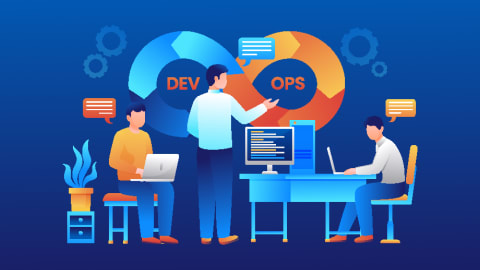




 Shivisha Patel
Shivisha Patel

















